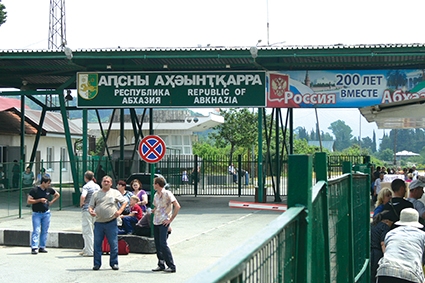West Disinterest & Unpleasant Developments in Breakaway Regions
Op-Ed
Georgia is experiencing a difficult period internally as well externally. On the foreign policy front, things are not looking up, as reflected by the G20 Summit in Hamburg last week which saw the country’s perils being all but ignored by world leaders. Internally, the country is preparing for the Tbilisi mayoral elections and a nationalistic march is ready to kick off in the heart of the capital over the coming days to protest ‘unsavory’ behavior by nationals from the Middle East. In addition, a number of high-profile court hearings of detained foreigners from neighboring countries are further heightening temperatures internally as many are led to believe in their being motivated by external actors.
But the real problem for Tbilisi is that there is a certain fatigue with the Georgia problem in the West. The frozen conflicts around Abkhazia and South Ossetia (Samachablo), while clearly problems, are not as immediate as, for instance, east Ukraine or even Nagorno Karabakh, where the situation has been tense for more than a year. There might be even more than just fatigue. For example, in western media few analysts these days note the problem and it is rare that this information niche is filled by analyses and reportative pieces.
However, it is this fatigue, relative disinterest and lack of information about the Georgian conundrum that is successfully used by the breakaway regions’ leaderships to strengthen their positions vis-à-vis Tbilisi. As I explained here several weeks ago, the installation of new makeshift ‘border’ signs could eventually create huge problems for transportation and overall security across the region. Yet Russia acts in South Ossetia according to its security concerns based on geography and a purported threat from NATO.
At the same time, as our eyes are on South Ossetia, a number of interesting developments are taking place in Abkhazia which are set to further destabilize the breakaway region and in the long run will create stronger bases for Russian influence there.
Last week, the opposition forces in Abkhazia mounted a full-scale campaign against Raul Khajimba’s government and began asking for his resignation. This not to say that the development is in itself a new one, but rather that it comes on top of an already fragile internal situation and the official understanding between the separatist government and the opposition force Amtsakhara.
The Agreement on Social and Political Stability signed in late 2016 with the aim to calm tensions and prevent confrontation between the Abkhaz leadership and the opposition has now been effectively broken. And this development comes just several days after the Russian presidential aide Vladislav Surkov, who oversees Russian influence in Georgia and Ukraine’s breakaway territories, made positive statements about Khajimba and the overall ‘political stability’.
The statements do reflect the extent to which the people in Abkhazia are divided along political lines. There are strong supporters of Khajimba who managed to become rich under his rule, but many of his previous supporters who helped him storm the presidential palace and impose forceful resignation on Aleksandr Ankvab are now in complete opposition to him.
Indeed, the problems in the breakaway region are numerous, making the stability unlikely. Unemployment is high and this in turn facilitates a high level of crime. One Russian tourist was killed several days ago in Abkhazia, resulting in the Russian government warning its citizens against travelling to the breakaway region.
Abkhazia lacks internal stability because the ruling politicians often lack money and experience to effectively manage the region, while the opposition forces are strong enough to stage manifestations and even cause resignations. An example of this complicated situation is the recent return of Ankvab to Abkhazia. Khajimba’s government, fearful of a reaction and not strong enough anyway, were unable to forestall his election as PM.
Yet, Moscow is closely watching the developments in the region as there always are elements in Abkhazia which do not agree with being entirely pro-Russian. Many fear that Russian money will leave ethnic Abkhaz without land. Unlike South Ossetia, where the population numbers are quite low and political life cannot become violent, in Abkhazia for Russia it is more prudent to have a divided political spectrum; a divided society where neither of the sides can gain the upper hand as a policy which will help Moscow hold off any anti-Russian sentiment gaining momentum. This, in the longer run, will help Russia to further its military and economic influence on political life in Abkhazia.
Emil Avdaliani












